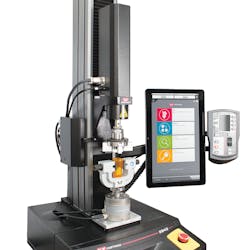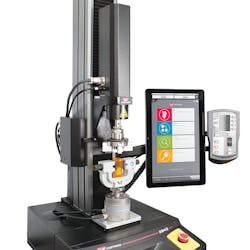Instron updates torsion-testing device
Instron has updated a device that can be added to its universal testing machines to convert an axial-only testing machine to a biaxial testing system. The testing-products company launched its Torsion Add-On 2.0 at the MD&M West trade show.
A biaxial test is more complex than an axial test because it twists material or applies torsional force in combination with the axial load. Medical devices, electronics, consumer packaging and automotive parts are among the products that might require such tests.
The Torsion Add-On 2.0 offers improved controls, updated Bluehill Universal software and the ability to perform unlimited rotational cycles, according to Theresa Smith, product manager for low-force applications at Instron.
“The Torsion Add-On 2.0 allows customers to add capability to their testing lab in a cost-effective manner,” Smith said. “It converts the axial testing machine into a biaxial testing machine without the added cost of purchasing a new biaxial machine. This saves money on equipment, as well as valuable lab floor space.” The machine can continue to perform axial tests after its conversion.
The updated software is intuitive and easy to use, she said.
“If you already have a 5900 with Bluehill Universal software, the training for the Torsion Add-On is simple because your operators already know how to operate it in axial mode. Running it with the Torsion, as well, is simple. They don’t have to learn a new system and new software. It reduces operator training.”
The updated Bluehill Universal software offers more intuitive control of the axial and torsional drives, she said. Calculations now incorporate force, torque, displacement and rotation measurements. Operators control the software on a touch screen that mounts on the testing machine.
Instron Connect is a new feature in the updated Bluehill Universal software that allows operators to contact Instron tech support from the machine rather than by phone or email.
“Operators can share test methods and results from their machine with tech support, which makes it easier to support the customer,” Smith said. “The software and this interface make
the machine user-friendly.”
Not all manufacturers are required to conduct torsion testing of their products if, for example, the products are not subjected to torsion loads during use. But some plastics manufacturers or their customers need to conduct these tests.
“We see substantial growth over sales of the original Torsion Add-on system, especially in biomedical industries,” Smith said. “Customers are testing films and plastic components, such as Luer lock connectors and syringes.”
Luer lock connectors are used on medical devices to ensure leak-free connections. They require rigorous biaxial testing outlined by ISO 80369. Some kinds of medical and consumer packaging, including pharmaceutical bottles tested in accordance with ASTM D7860, require simultaneous axial and torsional forces to be tested. Some medical tubing also must be tested, she said.
Bruce Adams, senior staff reporter
Contact:
Instron Norwood, Mass., 800-877-6674,

